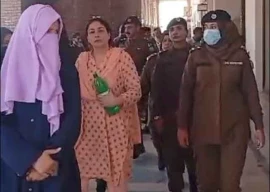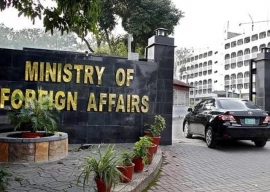
“The government should make teaching at public schools mandatory for fresh college graduates for at least a month. We are hoping to test this at LUMS,” Syed Babar Ali, one of the founding members of the Lahore University of Management and Sciences (LUMS), said on Tuesday.
Ali was speaking at the provincial launch of the Annual Status of Education Report 2011 (ASER) Punjab, released by the South Asian forum for Education Development (SAFED) and Idara-e-Taleem-o-Aagahi (ITA) in collaboration with the Foundation Open Society Institute (FOSI) and the Department for International Development (DFID) on Tuesday. The event was held at the Children’s Library Complex auditorium.
Ali blamed the lack of investment in education by the government for the state of education in the country. He said it was necessary to attract “best brains” in the country towards education and encourage them to pursue a career in it.
The survey was conducted in 85 districts across Pakistan, 28 of which were of the Punjab. Last year, the survey covered 15 districts in the Punjab. Besides conducting the survey in urban centres for the first time, it was conducted in 839 villages across Punjab.
With more than 5,000 volunteers, the ASER survey involved more than 16,000 households, with as many as 44,586 children tested for grade 2 to grade 3 level English and Urdu and arithmetic competencies.
The report indicates that only 33.5 per cent children could read sentences in English, while 47.8 per cent and 30.6 per cent could solve a two-digit subtraction sum and a three-digit division sum, respectively.
Out of the 1,379 schools surveyed in the Punjab, the students’ attendance in both public and private schools was recorded to be above 80 per cent. Teachers’ attendance was recorded at above 85 per cent.
Enrolment among children up to five years was recorded at 51.3 per cent, and in children between six to 16 years 83.9 per cent.
The ASER survey also indicated that 69 per cent mothers of these children agreed to be tested for literacy, only 41 per cent passed the tests by reading simple sentences in their mother tongue.
ITA head Baela Raza Jamil, while speaking at the launch, said, “The country is in a dire need for a legislation regarding the provision of compulsory education to children between five and 16 years of age.”
Jamil said the survey focuses on what exactly children are learning at school.
She said the survey results indicate that Rajanpur and Lodhran have the lowest enrolment percentage. She said the survey also indicated that the enrolment percentage decreased as the level of education rose. This was true of both private and public schools. The ASER survey, she said, which will cover all the districts in the province for the year 2012, will be conducted every year till 2015.
Aslam Kamboh, the schools Education secretary, said that there was a dire need to address the flaws in the education system as indicated by the ASER report. Calling resource allocation the biggest hurdle towards achieving quality education in the absence of a functional taxation system, he said mere legislation for resource allocation would not suffice. Kamboh said that enrolment and student retention needed to be given equal attention. With proper placement and availability of teachers in government schools, Kamboh said the quality of education could be improved.
MPA Dr Asma Mamdot, a member of the standing committee on education, said she agreed with Kamboh. She said the lack of teachers in the rural areas greatly contributed to the problem.
“The mushroom growth of private schools must be checked,” she said.
Chaudhary Javed, the standing committee on education chairman, stressed the need for bringing quality to the existing educational infrastructure. Javed said “open schooling” and “flexible schools” could be considered as options for school dropouts.
He also suggested that the number of hours a child was required to spend at school be revisited.
“Have we ever explored the possibility that perhaps less hours at school would be sufficient to impart the same education,” he asked.
Justice (retired) Nasira Iqbal said that right to education was as important as the right to live. She said in 2009, a compulsory education law was passed in India and that Pakistan was behind in this regard.
“Every province should form a commission to monitor the gaps in their educational system through public-private partnerships,” she added.
She criticised the government for failure of Daanish Schools saying that the government should make new laws only after taking experts in the field into confidence.
Sughra Qasim, a research volunteer at the ASER survey, said that of the 30 villages she had surveyed in the Faisalabad district, she had observed that the survey had helped sensitise parents to quality of education.
Sharing a similar experience, Sami Khan, another volunteer, said he had conducted the survey in Mianwali. “In 2008, when we went there to conduct the survey, the teachers at public schools were not very helpful. But now, people called our teams over if we had not included them in the survey.”
Published in The Express Tribune, February 8th, 2012.
COMMENTS (2)
Comments are moderated and generally will be posted if they are on-topic and not abusive.
For more information, please see our Comments FAQ




































This is actually not a bad idea. Infact if we can have 2 college grads at a time per class room session, then one can go around the class and help students practically solve problems in maths, science, urdu and english. Theory is a must but we also need a practical approach so that students can do it for themselves and feel more confident.
excellent, so proud of these people. we need to declare an education emergency in pakistan, with a mandatory draft for college graduates to serve as teachers for one year in public schools.